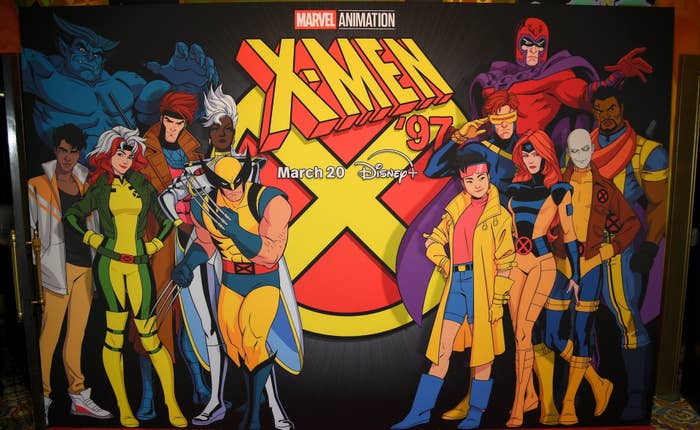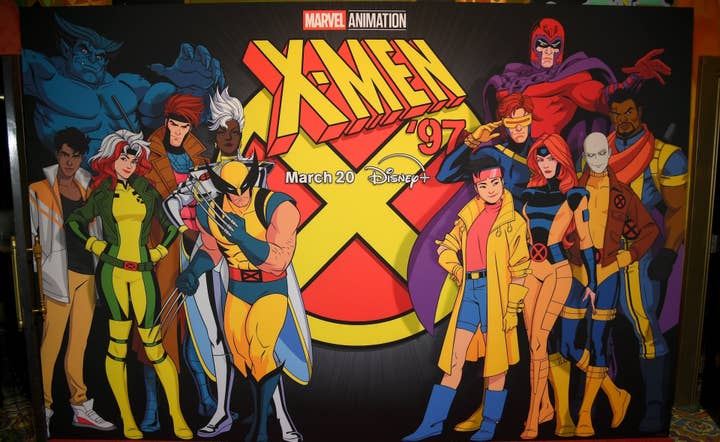
Nostalgia is a powerful drug, and one the comic-book film industrial complex has often been accused of pushing. However, on Marvel's latest, the Disney+ animated series X-Men ’97, the house of ideas manages to utilize sentimentality to fuel innovation and offer the most relevant mutant content since 2011's X-Men: First Class.
X-Men has remained one of the most popular and culturally important properties that Marvel has ever produced. In September 1963, the team of Stan Lee and Jack Kirby gave us a superhero experience that revolutionized the genre. DC had pioneered superheroes, but their characters—like Superman and Batman—were relatively flat, existing in a binary of good and evil. For its part, Marvel gave us Captain America in the 1940s, and how could Americans not adore someone who is a walking, fighting American flag? He even punched Hitler!
Lee and Kirby changed the paradigm. With the creation of the X-Men, they asked: What if the world doesn’t appreciate what these heroes do? What if they are outcasts? What if they are scorned, hated, and were the subject of prejudice? (Worth noting here is that these themes were particularly relevant because X-Men debuted during the peak era of civil rights protests, and were constructed as a pretty unsubtle allegory.) Would they still fight the good fight? Would they save the lives of the people that despised them? That is what made the X-Men so interesting and in this writer’s opinion so important to our culture.
Fast-forward to Halloween of 1992, when we were gifted the amazing saga of X-Men: The Animated Series. There had been previous attempts to bring the X-Men to the realm of Saturday morning cartoons, most notably the pilot episode “Pryde of the X-Men” that aired in 1989 and featured the core X-Men (and an Australian Wolverine for some reason). While that pilot received mixed reviews and was not picked up as a series, three years later we got exactly what we wanted.
The new X-Men cartoon was in the Fox Kids programming block but it was anything but a show just for children. The voice acting was superb, the animation exploded off the screen, and the show tackled the issues and conflicts that were done so well from the comic-book source material. Plus we can’t forget the theme song! Dear lord, that theme song! As soon as we heard that opening guitar riff we knew we were in for a treat. The hit series unfortunately came to an end in September 1997 and it was sorely missed for years.
In 2024, the people at Disney heard our call and brought the series back with a vengeance. X-Men ’97 premiered on Disney+ on March 20, with new episodes dropping every Wednesday. Halfway through the 10-episode run, here are three reasons why X-Men ’97 works so well and what the MCU can learn from its success.
Nostalgia is indeed a helluva drug.
For devoted fans of the original animated series, the draw is obvious: All of the beloved characters are back; the animation has been updated but stays true to the spirit of the original; many of the same voice actors returned; and of course, there is a slightly tweaked theme song that still slaps. Picking up right where the original left off, the show isn’t just as good as it was, it is better.
But the series isn’t just a trip down memory lane—it has a new storyline with real stakes
The tone of the first episode of X-Men ’97 is very lighthearted, almost luring the audience into a state of comfort, giving the false illusion that this will be a fun, nostalgic romp without much on the line. But before long, as the episodes unfold, it becomes clear that this is far from a simple retread of an old formula.
[Spoilers follow.]
The lives of the X-Men are almost immediately turned upside-down: the Jean Grey we have come to know and love may not have been Jean Grey at all; Charles Xavier is gone and the X-Men have a leader in the seemingly reformed Magneto; and most important (and shocking) of all, Episode 5 features an attack on Genosha that feels like the Red Wedding from Game of Thrones. Because we have developed deep, long-term bonds with these characters, the mid-season finale is especially rattling. Nobody’s safe.
It puts a new twist on the X-Men’s core struggle
X-Men ’97 has fully entered the war between homo-sapiens and homo-superior, and with any war there will be casualties. The series has already shown that it will not shy away from making sacrifices, fan-favorite characters be damned. What the X-Men franchise has always done well is capture the internal struggle our heroes have in defending a world that seeks to destroy them. No scene better exemplifies this than in Episode 5, when Cyclops tells a news reporter that every day he has to “prove that I’m a person.” X-Men ’97 masterfully echoes a core theme of the franchise: Because of human nature, no matter what these heroes do, they will be hated, simply because they are different. Now, more than ever, that truth hits home and this reality needs to be examined.
What the MCU can learn from X-Men ’97
It’s no secret that the MCU has been suffering as of late, whether it be from general superhero fatigue, rushed productions, or plain and simple bad writing. In the five years since 2019’s Avengers: Endgame, the MCU has put up a couple points here or there (for one—Willem Dafoe’s return as Green Goblin in 2021’s Spider-Man: No Way Home), but by and large, the bloom is slightly off the rose that is the Marvel Universe. Since X-Men ’97 and the MCU both live under the House of Mouse, perhaps Marvel Studios president Kevin Feige can learn a thing or two from the success of ’97 and incorporate these teachings into future films and TV shows.
That future promises a slew of new characters entering the MCU, as well as live-action films centered around the X-Men and the Fantastic Four. Many of these characters are rumored to appear in this summer’s Deadpool & Wolverine, which a lot of people are viewing as a kind of partial reset to the MCU. This is the chance for the universe to start on a semi-fresh slate and a whole new landscape.
What makes X-Men ’97 so compelling is the way it plays off long-lasting relationships that audiences have built with its characters. It’s as if the show’s writers told us: “You know these characters you’ve loved and held dear for over a decade? Well, don’t get too comfortable here, they could be gone next week.” This is also why the first Avengers movie did so well as opposed to the rush job that the DC universe gave us with 2017’s Justice League. The Avengers (2012) kicked off a multi-year build with each subsequent movie focusing on different characters before they were all brought together. In order for the audience to invest in the storylines, we need to care why things are happening to the characters. The Avengers series gave weight and significance to moments, not just trotting out Reed Richards in an attempt to get a few Leo DiCaprio finger points from the theater seats.
Recent Marvel movies lack the impact of a film like Avengers: Infinity War (2018), because the audience doesn’t feel as much for the characters. Sure, laughs are one thing, but the solution could be as simple as making you actually feel a connection to the characters again. Marvel has been giving us a lot of sandwiches, but not a lot of meat (or veggies if you prefer). If they cut back on the gratuitous cameos and half-baked TV shows, they could focus on specific characters and give them enough time to breathe and be appreciated, much as they did in the early days of the MCU. After Iron Man made his debut, we had to wait years before Captain America showed up. Give each major player enough time to shine and allow the audience to fall in love with them. The characters in these movies need more weight, and thus more impact on the universe as a whole.
Perhaps Disney’s plan to space out their upcoming MCU films will help with this. But Feige & Co. should never forget what it feels like to lose your favorite character and wait an entire year to see if they’d ever be seen again. X-Men ’97 is filled with happy successes and profound losses— and after all, isn’t that what always makes for the best stories?


